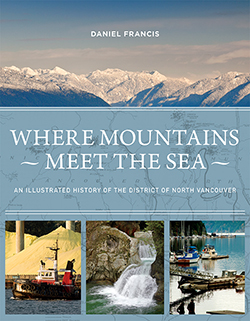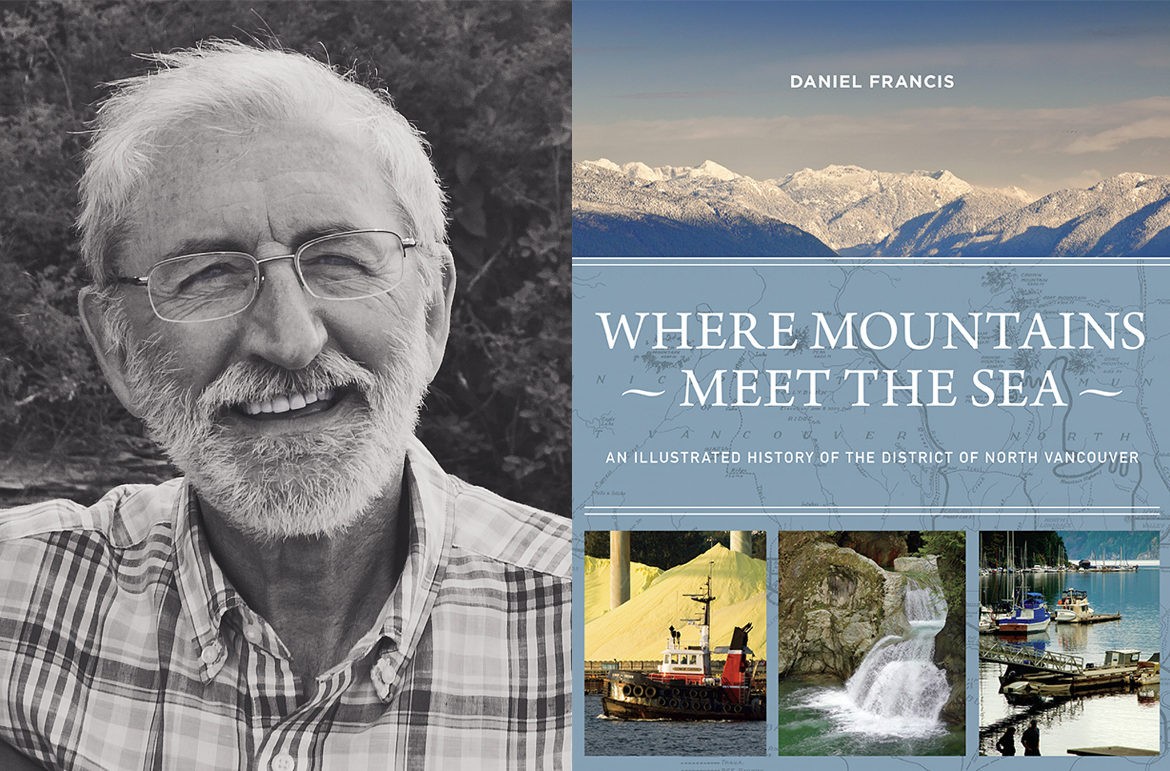Earlier this year Daniel Francis was awarded the British Columbia Historical Federation’s Community History Award for his latest book, Where Mountains Meet the Sea: An Illustrated History of the District of North Vancouver, which commemorates the 125th anniversary of the District of North Vancouver’s incorporation as a municipality. As a longtime resident of North Vancouver, we were curious what community history meant to him. Here’s what Daniel had to say.
Ten years ago historian Jack Granatstein famously declared that Canadian history was dead. In his 2007 book, Who Killed Canadian History?, Granatstein argued that the national story had been murdered by a combination of government bureaucrats, misguided school teachers, politically correct multiculturalists and pacifist feminists. Oh, I almost forgot, he also blamed the popularizers and journalists who attempt to appeal to a broad, non-academic audience and in the process, Granatstein thought, get almost everything wrong.
Come to think of it, that last category would include me. Which is why I know that Granatstein is the one who got it wrong. Canadian history is alive and well, especially here in British Columbia where all you have to do is look at a recent list of best-selling books to know that history, far from being a corpse, is thriving.
The issue here is what you think history should be about. For most people History — with a capital H – is about the big events: wars, elections, revolutions. The moments that shake the world and change things forever. Caesar crosses the Rubicon; Gutenberg introduces the printing press; the US drops a bomb on Hiroshima; humans reach the moon. These are the events we think of as truly historical. But what about the smaller events that affect our lives, the everyday changes that have just as much impact, sometimes more, on our communities as the world historical? Aren’t they history too?
One thing I discovered when writing my history of North Vancouver, Where Mountains Meet the Sea (Harbour Publishing), is that every community, every neighbourhood, has a history worth exploring if you take the time to discover it. In my own case, I had lived in North Van for thirty years when I embarked on my book so you’d think I would be pretty familiar with the details of its past. Yet as my research went on I found that I was discovering something new about the community almost every day.
Take Edgemont Village, for example. I was unaware that it has existed only since the end of World War Two, that it came into existence largely due to the work of architect Fred Hollingsworth who designed many of the streets and homes, and that Hollingsworth’s house, where he lived until his recent death, is one of the many West Coast modernist homes that connect the community to the history of modern architecture.
The same goes for Lynn Valley, once known as Shaketown, the “downtown” of North Vancouver where loggers and their families made homes for themselves before Vancouver was even on the map. Or Cates Park, where Tsleil-Waututh people have lived for thousands of years.
Granted these may be curiosities rather than world historical events. But they affect the way I relate to my neighbourhood, adding deep layers to my experience of the community.
My point is that not all history is national, or international. On the contrary, most history is local. Obviously World War Two was an important world historical event. But in North Vancouver it was experienced as an upsurge in activity down at the shipyards, and the blackouts and drills run by the local Air Raid Precaution brigades. Most of us experience history closer to home as it impacts our own community.
And the fact that people love to read local illustrates to me that whatever a few academics think, history is not dead. It is not even sleeping. It is alive and kicking and living on the street corners and in the buildings that we see all around us.
 Daniel Francis is a historian and author of over twenty books, and an editor of the Encyclopedia of British Columbia. Francis lives in North Vancouver, BC.
Daniel Francis is a historian and author of over twenty books, and an editor of the Encyclopedia of British Columbia. Francis lives in North Vancouver, BC.
Where Mountains Meet the Sea: An Illustrated History of the District of North Vancouver (Harbour Publishing, 2016) presents the story of North Vancouver in all its colour and complexity. Each section of the book is richly illustrated in full colour with biographies, eyewitness memories, artifacts from the collection of the North Vancouver Museum and Archives, historic photographs, maps and charts. For more about the book, read this in-depth Q&A in the Vancouver Sun.
British Columbia Historical Federation’s Community History Award recognizes valued collections of local history and research in a particular area. The award was presented to Francis on May 27, 2017.

